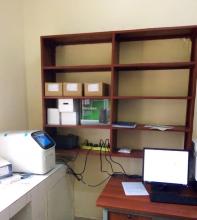EU and WHO setting up a molecular diagnostic laboratory in Wau for the detection of COVID-19
Juba, 1 September 2021 – The European Union (EU) and WHO establishes molecular diagnostic laboratory in Wau, Western Bahr el Ghazal State to increase testing capacity for COVID-19 and other high-threat infectious diseases.
In light of the efforts to expand COVID-19 testing in the Greater Bahr el Ghazal Region, a Polymerase Chain Reaction (PCR) machine and other molecular laboratory accessories have been procured and installed for early diagnosis and commencement of specific interventions for diseases control.
The laboratory will also support influenza sentinel surveillance, virological investigations and support sample referral from the peripheral laboratories in the region
“Testing capacity can be attained through the development of proper facilities and expertise”, said South Sudan’s Health Minister, Honourable Elizabeth Achuei. “The establishment of the PCR diagnostic facility in Wau will support patient care as well as public health actions”, Hon. Achuei added.
Wim Vandenbroucke, Head of Cooperation, EU Delegation to the Republic of South Sudan said, “the strengthening of the health laboratory in Wau is part of a much wider commitment of the European Union to assist the population in the entire South Sudan. We express our sincere gratitude to the health care workers in Wau and elsewhere, who are crucial for ensuring basic health care services for all South Sudanese, in particular for the most vulnerable”.
“We are thankful to the Ministry of Health and WHO to ensure that the lab in Wau will soon be fully operational.
Diseases are a major burden on the society and on South Sudanese economy. Most pathogens can only be detected with the help of modern laboratory technology and skilled personnel, which require a solid investment by the government”
Molecular diagnostics is one of the most evolving and essential tool for monitoring and controlling diseases.
“Ensuring quality diagnostics in laboratories is key to develop a sustainable public health response to infectious disease outbreaks and other global health security challenges”, said Dr Fabian Ndenzako, WHO representative a.i. for South Sudan. “Thanks to the EU, the installation of the PCR machine in Wau will strengthen the capacities of the country’s health system and improve the response to epidemics triggered by COVID-19 or any other dangerous pathogen.
Strengthening health systems requires the establishment of physical laboratories with the needed equipment, and the training of highly skilled personnel who can properly collect, handle, analyze and report findings.
Since the inception of the 1 million Euro project, considerable progress has been made including strengthening the National Public Health Laboratory capacity, procuring laboratory supplies, renovating the Wau laboratory infrastructure, training laboratory personnel on COVID-19 testing and sample management and the principles of COVID-19 infection prevention and control and supplying various equipment for running molecular COVID-19 laboratories.
Since the declaration of the COVID-19 outbreak on 5 April 2020, a total of 214 371 tests performed in South Sudan, of which 11 446 samples tested positive.
For more information, please contact:
EU - Email:delegation-south-sudan-hod [at] eeas.europa.eu
WHO South Sudan - Email: ebrahimj [at] who.int




